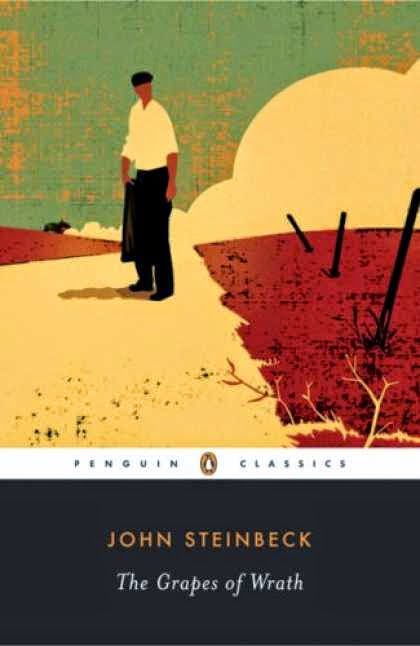Banned Book: The Grapes of Wrath by John Steinbeck
The Grapes of Wrath
by John Steinbeck
Tom Joad is making his way home to his family’s farm in
Oklahoma. He has served four years of his seven year sentence for murder. A man
stabbed him during a bar fight and Tom retaliated with a shovel. Now he is on parole
and the home he thought he would find is empty and broken. The only crop on the
farm now is cotton. His Pa, Tom Joad Senior, has moved the family in with their
Uncle John. The banks have taken the land and the only choice the family has is
to move west to California. A hand bill has been circulating asking for
workers. Farmers need people to pick peaches, apples and grapes. There is no
work to be had in this part of the country. People are either moving or
starving. Tractors are taking over and doing the work of hundreds. The Joads
have bought and packed up a truck with all of their belongings. What they
couldn’t pack, they sold. Tom has made the decision to go with his family the
two thousand miles west, keep his head low and start anew. There’s a new life
to be had in California. Or so they have all been told.
The Grapes of Wrath is an amazingly
poignant novel that thoroughly examines the Great Depression and the migration
of families to the west during the Dust Bowl. The Joad family is the typical
Oklahoma family. All the decisions that are being made are for the good of the
family. They sincerely believe that their only option, at this point in their
lives, is to move west to California. They have dreams of good paying jobs,
white houses and stability. It seems like a dream. A dream they can believe in
and pour their hearts into. Then the journey begins and slowly the dream starts
to unravel. The truth is being revealed with each mile they travel. More and
more people are migrating west. They are one family out of hundreds of
thousands of families moving west with the same high hopes and expectations.
Fear, hunger and desperation begin to hunt the Joads. It begins to change the
Joads and all the people around them.
In my
opinion, it is hard to put into words what Steinbeck did with this novel. In the
beginning you are filled with the same kind of expectancy as the Joads. You
have high hopes for them and you want them to succeed. Then your heart starts
to slowly break when you realize the hardships that they are going to face.
Reading this now as an adult, opposed to the teenager I was the first time I
read this novel, it’s terrifying. I could never imagine having to make the
decisions that the Joads had to make. The idea of watching my child starve or
suffer in this manner is unbearable. The
Grapes of Wrath was hard for me to read at times because of all the
emotions I was experiencing. Especially that sense of hopelessness that becomes
overwhelming. This was so ingeniously written with the Joads as the center
point but with moments during the narration when you were made aware of other
occurrences. Just beautifully put together.
Now
this book was published in 1939. At that time the book was actually burned by a
public library in East St. Louis and banned from a library Kansas City, Mo for
its vulgar use of words. This novel has been challenged and banned for
religious reasons like taking the Lord’s name in vain and because of its
description of a preacher who lost its way. It saddens me when a story so full
of life and descriptions of hardships are ridiculed for something as minor as
foul language. Look beyond the script to find the deeper meaning in the text.
I’m sure the last thing Steinbeck wanted anyone to focus on in the over four
hundred page novel is the word “Bitch” and “Goddamn.” If anyone reading this
book couldn’t handle the language within, they probably wouldn’t have been able
to handle the hardships and life lessons experienced within these pages.
http://www.ala.org/bbooks/frequentlychallengedbooks/classics/reasons Retreived 06/27/2014




Comments
Post a Comment